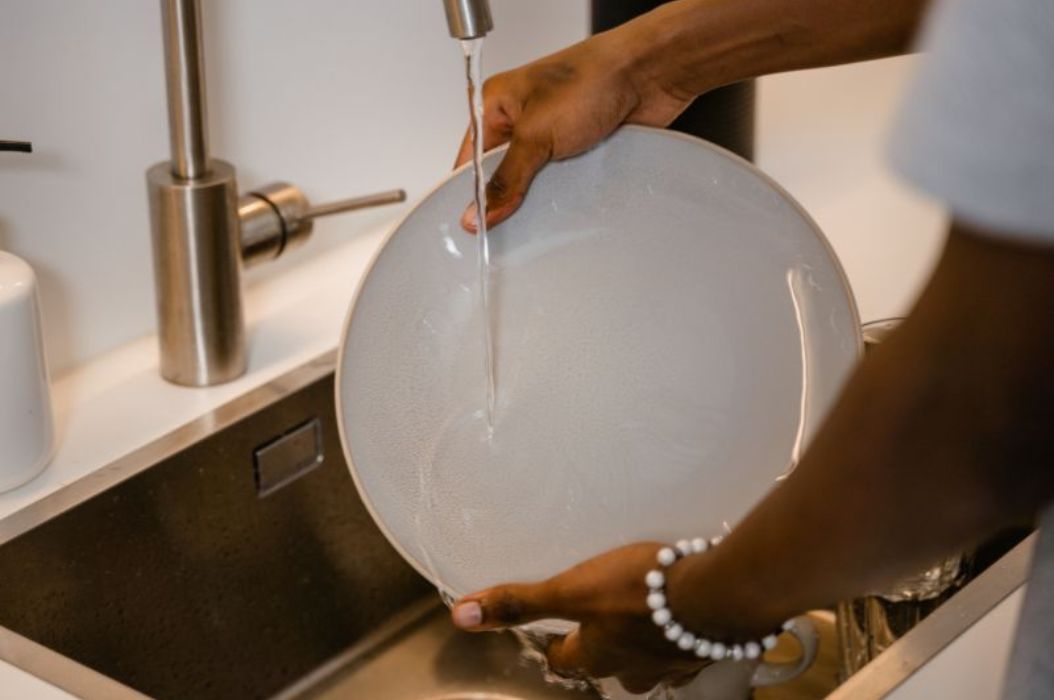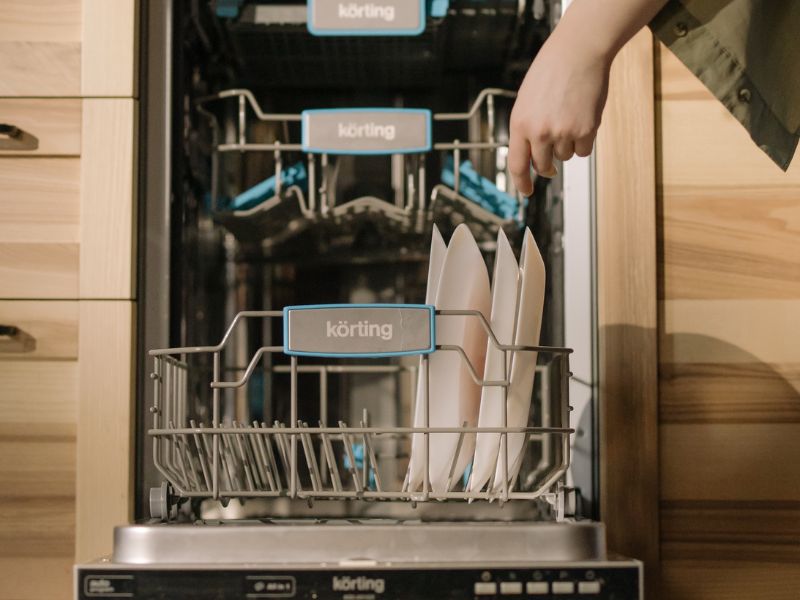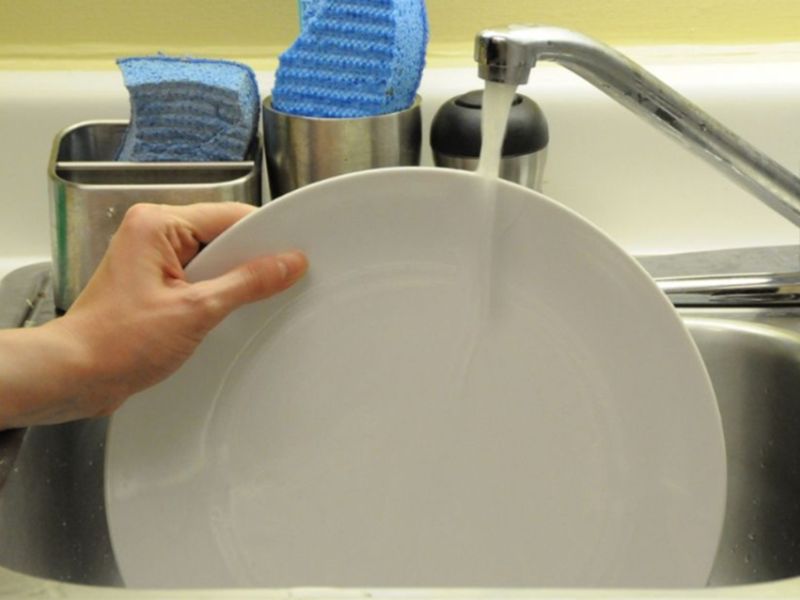A dishwasher can rinse, heat, and air dry your dishes to give a perfect cleaning for your unwashed dishes. It consists of sensors that measure the toughness of food particles staked on the dishes and automatically perform work.
If you rinse your dishes before putting them in the Ddshwasher that may hamper the cleaning performance of your Dishwashers. So, it’s better to avoid pre-rinsing before installing your dishes in dishwasher. Yet, there are some expert ideas that may be opposite to this issue.
Going through the entire context, you can come to a verdict on what you should do to get the best cleaning performance from your dishwasher.
Should You Rinse Your Dishes Before Putting Them in the Dishwasher?
It’s really not necessary to rinse your dishes before you stack them inside the dishwasher. Moreover, the pre-rinsing can hamper the performance of your Dishwashers as they have sensors that detect the toughness of strains. And then prompt cleaning works according to the sensor’s indication.
The sensor’s power is really crucial to get perfect cleaning. You can get various types of dishwashers that may differ in style, features, and overall performance. The last time I observed the market and got experience of three top-rated best dishwashers under 700. These Dishwashers also had good reviews on their online pages.
Why You Don’t Need to Pre-Rinse Your Dishes
You may think that before stacking the dishes inside the Dishwasher, pre-rinsing may make your dishes cleaner. But you are not absolutely right. Because of the mechanical facts and also for saving water from being wasted, you should avoid pre-rinsing.
Soil-Collector And Pressure Sensing System
While washing the dishes the soil sensor system identifies the stickiness of food particles on your dishes. Depending on this, the system increases the water temperature and adds time to the wash cycle. Plus, it releases a specific quantity of detergents and then drains the soiled water.
Pre-rinsing can hamper the performance of your dishwasher, the sensors can’t set perfect programming for the best cleaning. Rather, It just gives a light cleaning thinking that the dishes are already clear.
On the other hand, The pressure sensing system detects how much gunk is coming from the first washing cycle. Then it takes action accordingly. But if you pre-rinse your dishes, this sensor can’t set a perfect cleaning process. And then deliver a light cleaning to your dishes.
Detergent Is Clingy
Some branded Dishwasher detergents contain enzymes that tend to break down the food particles stacked on the dishes. The enzymes grab onto the staked food and dissolve them so that these particles can come out easily and wash away. So, If the enzymes do not get something to latch onto, they can’t work properly and deliver better cleaning.
Pre-Rinsing Is A Misuse Of Water
In some statistics, we use 2 to 6 gallons of water per minute when rinsing dishes. Though it depends on the number of dishes, and how many dishes we take to wash. But on average we waste up to 15 gallons of water per load, washing on our sink. The researcher found that we use 100 liters of water to clean 144 items in every cycle of hand-washing.
But the Dishwashers can use only 12 liters to wash the same quantity of items. This is almost 80 percent less than hand-washing. So, it’s simple logic that if we rinse dishes before putting them in the dishwasher, it’s a mere waste of water.
Know the Art of the Scrape
The only thing you can do for the dishwasher is to scrape the solid food from the dishes. The Dishwasher’s filter and drain aren’t typically designed to dispose of the solid items in the garbage. Obviously, it’s not wise to pile the dishes with half-eaten food in the Dishwasher. So, be careful when loading the dishes for washing, and remind yourself to scrape the chunk of food before dishwashing. You have to do it artistically and have to leave the rest for the dishwasher to clean off.
When Should You Rinse?
Yet, You can make a light rinse before Dishwasher, if you have dried mayo or jelly. These types of particles do not tend to easily come off knives so you can make a pre-rinsing. Runny eggs, yolks, and Chinese sticky rice turn into glue when they dry so you must pre-rinse those Dishes before putting them into Dishwasher. You can get a few logical reasons for pre-rinsing mentioned below.
Prevent Clogging Filter
According to some expert ideas, we come to know that pre-rinsing is still needed. If you rinse your dishes before putting them in your Dishwasher, there will never be a clogged filter. Rinsing, heating, and air drying inside the machine may eventually end up with a backed-up drain hose. So, it’s sometimes necessary to rinse your dishes before putting them into Dishwasher.
Poor Soil-Sensing System
Some dishwashers may have a poor soil-sensing system or the dishwasher may become less sensing after long use. So, they can’t set the jet to work perfectly. In these cases, you should pre-rinse the kitchen utensils for better cleaning. Before buying a dishwasher, you should manually check its sensing systems. Otherwise, you have to pre-rinsing every time before putting them in through the dishwasher.
Detergents May Oxidized
The unsealed detergent powder may become oxidized or lose its cleaning power after long use. You may have noticed that the new box of detergents you use for washing works excellent at first use. But they can’t do the same by the time you go to the end of the detergent box. Because they may become oxidized and can’t cling to the food stake on dishes to dissolve them. So, you need to pre-rinse your dishes to get better cleaning.
Maintain A Balance
While you rinse your dishes before putting on Dishwasher leave enough stuff on them. So, the Dishwasher sensor can identify the specks of foods and set a strong jet for washing. You should not put too many food particles that can clog the filters. Thus, maintain a proper balance to get the best cleaning from your Dishwashers.
Final Thoughts
Dishwashers can give you an expected cleaning wash if you know the strategies when to pre-rinse your dishes or when not. Actually, it’s not a good idea to rinse your dishes before putting them in the dishwashers.
Dishwashers are typically designed to make your kitchen jobs. These machines perform better when their sensor measures tough particles in foods, stacked on your dishes.










Leave a Reply